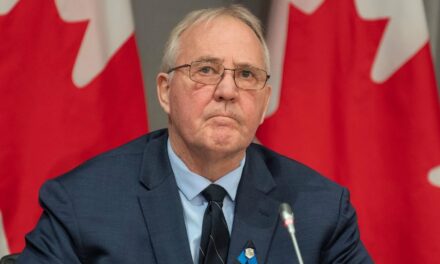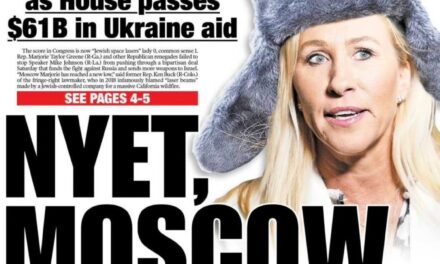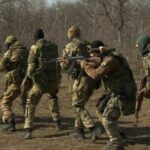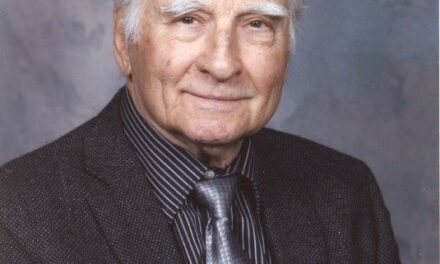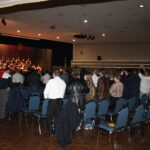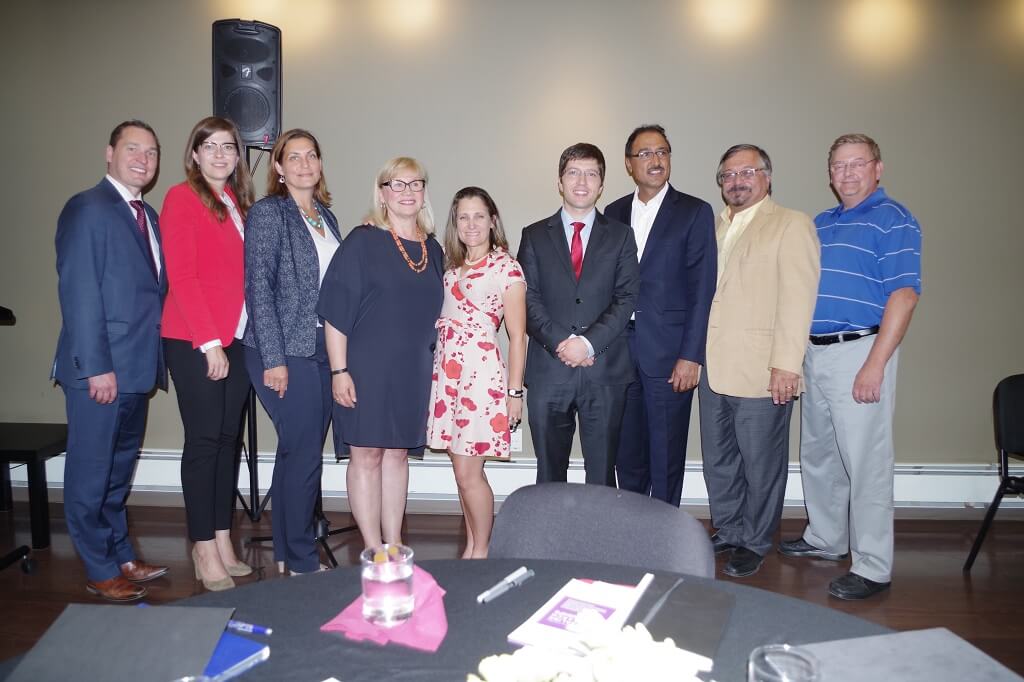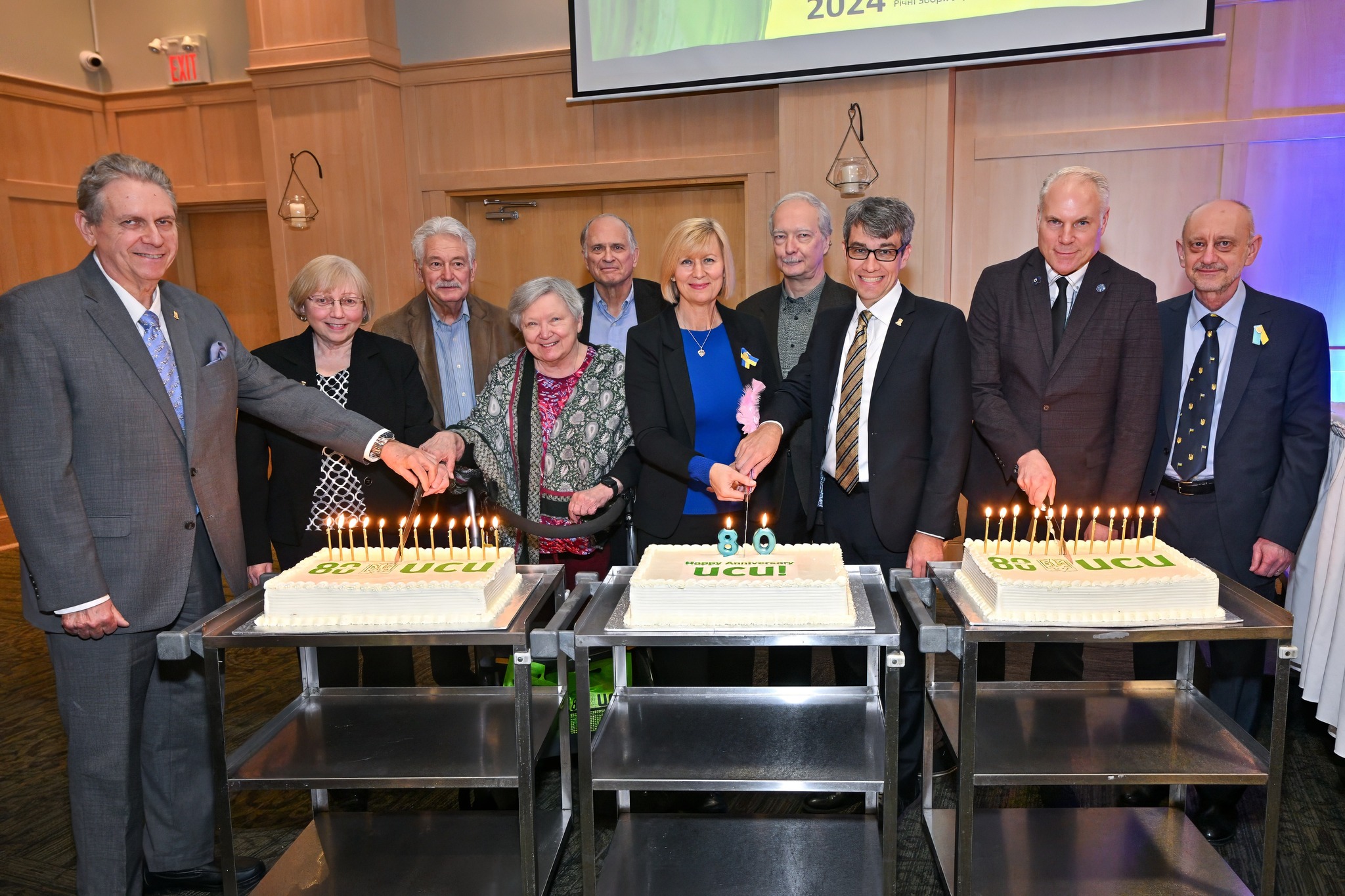Marco Levytsky, NPUN Western Bureau.
Noting that Ukraine voluntarily gave up a vast nuclear arsenal in return for guarantees of its sovereign borders under the 1994 Budapest Memorandum, which was signed by Russia, the country now deserves “unflagging international support”. “It’s an incredibly dangerous precedent. It says to other states ‘be careful about giving up your nuclear weapons’, and that, I think – particularly today is message we have to be very mindful about,” said Chrystia Freeland during a meeting with Edmonton’s Ukrainian community, organized by the Ukrainian Canadian Congress – Alberta Provincial Council, at St. John’s Institute, August 11.
She noted that the unanimous approval of the Canada-Ukraine Free Trade Agreement (CUFTA) shows the “depth and breadth” of support for Ukraine among all parties in the House of Commons, but added that “it’s very important not to frame Canadian support for Ukraine as purely a question of… connections between our communities.”
“Those connections are essential. I am incredibly proud of them and it’s wonderful how our communities manage to keep them alive. But Canada’s support for Ukraine and Canada’s opposition to the invasion of Ukraine and annexation of Crimea and the ongoing war in Donbas is first and foremost a matter of Canada standing up for the rule of law. It’s first and foremost a matter of Canada understanding the absolutely devastating, absolutely dangerous consequences for the global-based international order of allowing these actions to stand unchallenged,” Freeland said.
The visit was somewhat of a homecoming for Freeland, who was born in Peace River, AB, and grew up in Edmonton.
Amarjeet Sohi, federal Minister of Infrastructure and Communities, who also attended the event, joked that she was welcome to run in any Edmonton riding, including his own constituency of Edmonton Mill Woods.
Elaborating on CUFTA during the question and answer period, Freeland said CUFTA is both a tremendous business opportunity for Canadians and also a way we can support Ukraine, since creating a prosperous democratic state will bolster public support.
Canada is helping Ukraine with its reforms – particularly in the highly successful program of police reform “and people are really understating the progress” that Ukraine has made in fighting corruption since 2014.
Asked by New Pathway-Ukrainian News why neither Igor Sechin, CEO of Russia’s oil giant Rosneft, nor Vladimir Yakunin or his successor as CEO of Russian Railway have been placed on Canada’s sanctions list under her tenure as Foreign Minister, when she criticized the former Conservative government for keeping them off when she was in Opposition, Freeland avoided giving a direct answer.
Instead, she stated that “Canada’s sanctions against Russia… are the strongest in the world” and that “we are extremely clear as a country in both our political attitude towards Russia and in following up on very specific actions – actions that bite.”
Critics have charged that the Government of Canada is hesitant to sanction the CEOs of Russian Railways and Rosneft because Russian Railways have very close relation with Quebec’s Bombardier, which were outlined in a March 2017 investigative piece by Mark MacKinnon of the Globe and Mail, while Rosneft has a 30% stake in the Cardium tight oil project in Alberta, run by Imperial Oil and ExxonMobil Canada.
Responding to another question whether Canada will follow suite in providing lethal arms to Ukraine now that the U.S. Congress has passed a bill – actually signed by President Donald Trump – calling for that measure, she also avoided a direct response.
Instead, Freeland pointed to Operation Unifier under which Canadian officers help to train Ukrainian troops, which has been described as very successful by the Ukrainian military and the recently signed defence agreement with Ukraine which provides for future defense cooperation.
When asked by Dr. Roman Petryshyn, former Director of the Ukrainian Resource and Development Centre at Grant MacEwan University, about the possibility of organizing a federal-provincial initiative to bring post secondary educators from Ukraine and Canada together to propose extension of current programs, she said she approved and gave him a contact person to pursue that matter.
Freeland also mentioned the “global Magnitsky initiative” which Canada will join in the fall when it passes legislation which would expand sanctions against foreign officials involved in violations of human rights.
The bill is inspired by the case of Russian lawyer Sergei Magnitsky, who died while exposing government officials involved in a $230 million tax corruption scheme. U.S. anti-Putin campaigner Bill Browder, who had hired Magnitsky as the lawyer for his Moscow-based Hermitage Capital Management hedge fund in 2005, has led the international effort to sanction human-rights abusers.
Similar legislation has already been adopted in both the United States and the United Kingdom.
She gave credit to Senator Raynell Andreychuk, Conservative James Bezan, and fellow Liberal Borys Wrzesnewskyj for the work they did on this issue.
Also present at the meeting was Alberta Minister of Economic Development and Trade Deron Bilous who told the audience that he is planning to lead a trade mission to Ukraine in October. He said more details will be made public during Alberta’s first celebration of Ukrainian Canadian Heritage Day on September 7.
Share on Social Media







